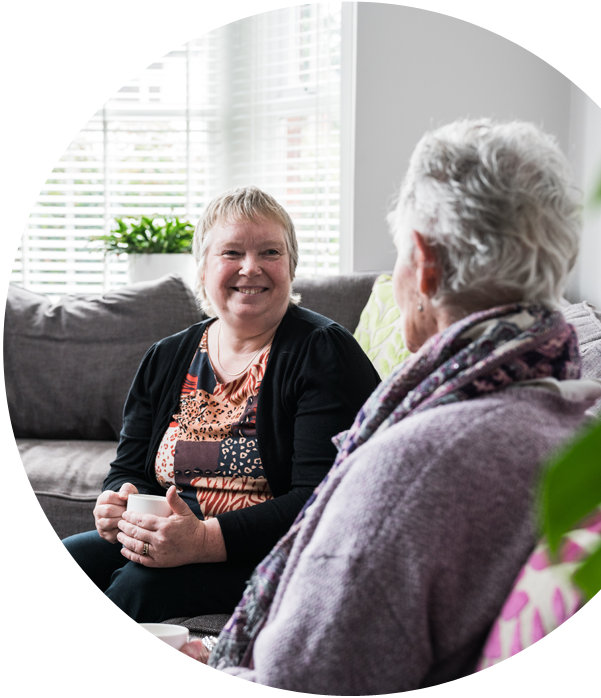Home care after knee or hip replacement surgery
Receiving compassionate care in the safety and comfort of your own home has far reaching benefits in improving well-being for a person needing post-op care after hip or knee replacement. Our highly personalised support, delivered by a well-trained carer on a one-to-one basis, promotes positive rehabilitation. Your rehabilitation programme is guided by you and set at your pace, offering reassurance and peace of mind for all the family.

Problems with our hips and knees occur as we naturally age but can also be caused through other conditions, like arthritis or injuries, for example a fracture following a fall. This can result in you living with bouts of chronic pain and lead you to feel less confident in carrying out our usual day-to-day activities and tasks, reducing your control over life and independence.
For many these problems can be resolved using pain management techniques or alternative therapies, but for some more specialist medical treatments are needed, including replacements to cure disease and repair injuries.
In England and Wales, according to the National Joint Registry, over 160,000 hip and knee replacements are performed every year. A third of these are performed in independent hospitals and two thirds by the NHS.
Adults of any age can be considered for a knee replacement, although most are carried out on people between the ages of 60 and 80. As artificial joints typically need to be replaced after 10 years most people hold off if they can before they seek a replacement.
For others however the benefits of having the surgery as soon as possible with a robust plan for recovery means they can start to live life again and regain independence and choice in how they live their life.

What is included in our knee replacement aftercare?
- A comprehensive assessment of your care and support needs by our expert care manager. We can devise a comprehensive plan of knee replacement aftercare working with the hospital Physiotherapist and Occupational Therapist to structure the plan ready for you to be discharged
- A falls management plan to ensure safe mobility in and around the home during your rehabilitation
- Dedicated support from our in-house Occupational Therapist through our OT-led service during the convalescent period
- Managing and administering medications
- Companionship as and when you need it
- Providing discreet and sensitive personal care
- Attending post-operative follow up appointments with you at hospital or GP practice
- Specialist nurse-led care through our nurse-led service
- Planning and cooking mealsFacilitating social arrangements in the home
- Trips and visits out of the home in your local community
- Domestic tasksCaring for your much-loved pet
What to expect following knee or hip replacement surgery
Once you have had joint replacement surgery, you will spend a period of time in hospital to recover from the operation. For most people knee replacement post op after care is usually 2-5 days, and for hip replacements it is 1-2 weeks.
Before you are discharged from hospital a comprehensive knee replacement after care recovery plan, or a hip replacement post-operative care plan will need to be in place to support your rehabilitation.
During your recovery you are likely to experience swelling, stiffness and some pain in and around the joint and for some this can take several weeks to settle. This will make it difficult to move about and mobilise.
Initially, you may require assistance and support to ensure you are able to move safely and to reduce the risk of falling, which is more common following knee or hip replacement surgery. The wound may also be sore following surgery and will need to be cared for to avoid any infection occurring.
At The Good Care Group, we can provide a comprehensive plan of knee replacement aftercare, with clearly defined goals ahead of you leaving hospital. This will ensure you are working on your rehabilitation from the moment you come back home. Our care manager will work with the hospital discharge team to ensure a swift and efficient discharge from hospital with everything in place, including any equipment you may need to enhance your rehabilitation programme and support you at home.
PREPARING YOUR HOME FOR KNEE AND HIP RECOVERY
It is important to prepare your home for knee and hip recovery. Here are some steps that you can take before your surgery to create a safer environment for you to recover in.
- Create clear paths at home for you to walk by removing any obstructions such as cables, rugs and furniture.
- Place items that you’ll want to reach for often, like clothing or toiletries, in easy-to-reach places.
- Install a handrail in the bathroom and use a seat for your shower to help prevent slips and falls.
- Ensure that you have comfortable clothing readily available that are easy to take on and off.
- Check that you have a chair that is high enough and firm enough so that your knees are under your hips while sitting.
Benefits of professional knee and hip recovery care
At the heart of our live-in care service is enabling people to live well in their own home with the care and support they need from a carefully well-matched, trained professional carer who provides a better quality of life for those receiving care, whilst families receive a fully managed and regulated service that they can trust and rely on.
A person who has just had knee or hip replacement surgery is likely to be experiencing difficulties with tasks of daily living, including standing to cook meals, washing and dressing, walking from room to room and managing domestic tasks, both in and outside the home.
There are far reaching benefits to receiving our high-quality live-in care service:
Safe movement around your home
Our live-in care service following knee and hip replacement surgery is highly personalised focusing on a true understanding of the person’s needs. We understand how much mobility will be affected and our dedicated professional carer will ensure you are able to move safely around your home, providing gentle encouragement to ensure you reach your goals and regain your independence. If you need any equipment to support your rehabilitation programme and aid safe movement, we can provide expert advice on what would work best for you.
We know how much lack of mobility and independence can affect a person’s mood. We not only recognise the physical issues a person is facing, but also the impact these can have on their emotional, social and psychological wellbeing and adopt a compassionate, flexible and holistic approach to knee and hip replacement aftercare recovery. Your dedicated carer will support and encourage you to complete your physiotherapy programme, ensuring you complete your exercises when you should.
OT-led care at home
Our dedicated Occupational Therapist (OT), Jackie Cooper will not only liaise with doctors, district nurses and NHS OT’s and physiotherapists, but is also on hand to be able to conduct a thorough OT assessment to facilitate fast and discharge from hospital following knee or hip replacement surgery.
If required Jackie will co-ordinate any requirement for equipment, so you can get home as quickly as possible to be cared for in comfortable and familiar surroundings with all the care you need. Our OT-led care at home ensures our professional carers are focused on and supported to deliver a holistic and multi-disciplinary approach to home care after hip replacement. Jackie will oversee your rehabilitation programme working with the care team to ensure goals are reached and outcomes achieved.
Reduced risk of falls following knee and hip replacement surgery
At The Good Care Group, we know that falls and fall-related injuries are more common for people who have had a knee or hip replacement and cause pain, injury, loss of confidence and independence. Our approach to providing high quality care at home has seen us reduce falls by 88% on the previous year, and our diligent professional carers ensure our clients experience fewer falls that result in serious injury than the average convalescence home resident.
Effective and efficient medications administration
All our professional carers are trained in the management of medications. They will ensure you take your medications as and when you should following your hip or knee replacement surgery. They will ensure that pain and discomfort caused from surgery is minimised as much as possible by efficiently prompting taking of pain relivers.
Supporting domestic and household tasks
When you are receiving our home care after hip replacement or knee replacement aftercare, you will not need to worry about any of the day-to-day tasks around your home. From preparing and cooking your meals, to keeping on top of laundry and cleaning of your home, your professional carer will ensure all your household chores are done so you can focus your time and energy on your recovery.
Supporting you to attend follow up appointments
Your carer will be on hand to attend post-operative hospital or GP follow up appointments with you if needed, taking away the worry from you and your family.
What are your aftercare options?
Our hip and knee replacement post-operative care is highly flexible and can be provided in the following ways, depending on your individual needs and the goals you need to achieve:
- Live in care – one-to-one care from a dedicated professional carer can be provided around the clock giving you much peace of mind. This may be suitable for those who are already living with other complex or specialist conditions in addition to recovery following surgery.
- Respite care – flexible respite services from as little as two weeks can provide the care you need for shorter periods of time to fit in with your hip replacement after care programme. Respite care also enables a family carer to take a much-needed break from caring for their loved one.
- Nurse-led care – if you require clinical interventions usually performed by a district nurse following surgery, nurse-led care after hip replacement and knee replacement can be provided by a competent and trained carer, overseen by a team of clinical experts.
- Hourly care – a visiting carer can come to your home from as little as 30 minutes a day to as many hours or visits as you need to support you at the times you need it most during the day, for example getting up in the morning and preparing food at lunchtime.
- Short term care – a professional carer will support you in own home following hospital discharge and provide post-op hip and knee replacement aftercare and rehabilitation
- Overnight care – if you need the reassurance that your care needs can be met overnight during the initial phases of rehabilitation, a professional carer can provide sleeping night care. The carer is on hand to support you up to twice during the night, providing you with comfort and reassurance that someone is there should you need them. Sleeping night care then enables the same carer to undertake their role supporting you during the day.
EXERCISING AFTER HIP OR KNEE REPLACEMENT SURGERY
Engaging in light physical activity after your hip or knee replacement can help reduce swelling and increase your hip and knee strength. Before beginning any new exercise program, have a discussion with your GP to ensure these exercises are appropriate for your recovery. They can also provide guidance on how to incorporate these exercises safely into your day-to-day routine.
- Walking: Walking is the ideal way to strengthen your hip or knee. As you begin walking again after surgery, be sure to take only small steps and travel only short distances. As your knee or hip strengthens, you’ll be able to gradually increase the distance without discomfort.
- Swimming: Swimming is an excellent form of exercise as it is not load-bearing and should therefore not cause any discomfort to your hip or knee. Start slowing and increase the distance you swim gradually as you gain confidence and strength.
- Cycling: Cycling after a knee or hip replacement can help you improve your range of motion. Early on in your recovery, the seat can be raised to limit the amount of bending required. As your range of motion and strength improve, the seat can be lowered.
- Resistance training: When done with the correct form, weightlifting or resistance training can strengthen muscles, increase bone density and prolong the life of artificial joints. Speak to your GP or physiotherapist to learn more about the types of resistance that you can safely perform after your surgery.
Talk to us about your care needs
To talk about your care needs, contact one of our friendly advisors. Calls from landlines are free.

